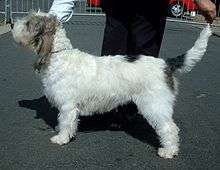Grand Basset Griffon Vendéen
 Grand Basset Griffon Vendéen | ||||||||||||||||||||||||||||
| Other names | Basset Griffon Vendéen (Grand), GBGV | |||||||||||||||||||||||||||
|---|---|---|---|---|---|---|---|---|---|---|---|---|---|---|---|---|---|---|---|---|---|---|---|---|---|---|---|---|
| Common nicknames | GBGV | |||||||||||||||||||||||||||
| Origin | France | |||||||||||||||||||||||||||
| ||||||||||||||||||||||||||||
| ||||||||||||||||||||||||||||
| Domestic dog (Canis lupus familiaris) | ||||||||||||||||||||||||||||
The Grand Basset Griffon Vendéen is a dog breed from France.
History
The Grand Basset Griffon Vendéen is derived, like all bassets, from hounds of superior size, in this case the Grand Griffon. The first selections were made at the end of the 19th century by the Comte d'Elva who was looking for subjects with "straight legs". But it was Paul Dézamy who was especially responsible for fixing the type. He had understood that in order to catch a hare, dogs of a certain size were needed. He fixed the size at about 43 cm. Today used primarily when hunting with a gun, it is capable of hunting all furry game, from the rabbit to the wild boar. A team of Grand Bassets won the 5th edition of the European Cup for hare.[1]
Appearance
Basset
Grand Basset Griffon Vendéens a long-backed, short legged hunting breed of dog of the hound type, originating in the Vendée region of France. They are still used today to hunt boar, deer, and to track rabbit and hare, but are more commonly kept as a domestic pet.
They are pack dogs, so owners should either spend a lot of time with them or get a second dog or cat. They have a happy and confident personality, which can sometimes manifest itself as disobedience, but they are great companions.
Health
The UK Kennel Club conducted a health survey of Basset Griffon Vendéens (Petit and Grand varieties combined) in 2004.[2] This is apparently the only completed health survey (as of July 16, 2007)[3] that might include Grand Basset Griffon Vendéen, but it is unclear what proportion of dogs in the survey were Grand Basset Griffon Vendéens instead of the more common Petit.
Longevity
Average longevity of 76 deceased Basset Griffon Vendéens (varieties combined) in the 2004 UK Kennel Club survey was 12.1 years (maximum 17.3 years).[2] Leading causes of death were cancer (33%), old age (24%), and cardiac (7%).
Compared to surveyed longevities of other breeds of similar size, Basset Griffon Vendéens have a typical or somewhat higher than average life expectancy.[4]
Among 289 live Basset Griffon Vendéens (varieties combined) in the 2004 UKC survey, the most common health issues noted by owners were reproductive, dermatologic (dermatitis and mites), and aural (otitis externa, excessive ear wax, and ear mites).[2]
See also
References
- ↑ http://www.grand-basset-griffon-vendeen.com/Breed_Standard.htm
- 1 2 3 "Purebred Dog Health Survey". KC/BSAVA Scientific Committee. The Kennel Club. Retrieved 5 July 2007.
- ↑ "Dog longevity web site, breed data page". K. M. Cassidy. Retrieved 8 July 2007.
- ↑ "Weight and longevity page". K. M. Cassidy. Retrieved 5 July 2007.
"Grand Basset Griffon Vendéen" FCI-Standard N° 33 14 February 2001 World Canine Federation